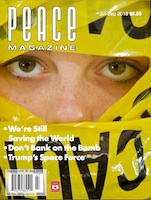Move The Nuclear Weapons Money: A Handbook for Civil Society and Legislators
International Peace Bureau (IPB), Parliamentarians for Nuclear Non-proliferation and Disarmament, and the World Future Council, 2016
At only 24 pages this Handbook is just a pamphlet for those who have not been engaged on nuclear arms control and disarmament. It predicts: “Over the next ten years, governments will spend a staggering US $1 trillion on nuclear weapons.” Actually, it may be much more. Global Zero’s 2011 estimate of nuclear weapons’ costs for the US only admits that the full costs are not included. Besides, there are about 13 other ‘nuclear weapon states too, and their costs are not presented. In fact, no record of past and present costs of nuclear weapons world-wide seems to exisst. Without at least a “ball-park” financial estimate, no meetings with parliamentarians can get beyond generalities and moralizing.
The costs and savings of both disarmament and development are connected. Both the UN Sustainable Development Goals (2015) and the implementation of the COP 21 will require large expenditures. The Handbook notes that nuclear disarmament would help with that, but it does not state how much or with what priority.
The IPB Action Agenda calls for moving defence strategies toward human-security approaches.” But is the money that actually can be ‘moved’ from nuclear weapons sufficient to pay for nonproliferation and nuclear disarmament? Even if it is a large sum, it can suffice only if the planning is coherent and flexible in terms of timing and politics.
It may make more sense to produce a Handbook for people who are unperturbed by the risks of nuclear weapons, to help change their position. For this, the debate needs to address other consequences of nuclear disarmament: social, economic, political, technological and cultural.
There is considerable support for nuclear weaponry. Some military, some politicians, some corporations and some citizens consider it needed and therefore worth the cost and the risk. Donald Trump wants to improve America’s nuclear capability and has promised the US armed forces “lots of stuff.” More recently he stated: “if countries are going to have nukes, we’re going to be at the top of the pack.”
Support for nuclear weapons will not be eliminated until we present informed alternatives to those who favor keeping them. They include people whose livelihoods depend on the nuclear industry.
Sections 5, 6 and 7 of the Handbook address parliamentarians. However, legislators vary in their competence. The able ones are invariably busy, working in a sea of information overload and alternative facts. Until they have some facts about the cost of getting rid of nuclear weapons, they will relegate that file to the bottom of their to-do lists.
The Handbook ignores the connections between nuclear energy and nuclear weaponry. Given current worries about climate change and the opportunities terrorists may have to make dirty bombs, these connections need to be analyzed. The Handbook will be complete only when those both for and against nuclear weapons comment on it. Completing it will improve the likelihood that realistic priorities can begin to be assigned to a complex and lengthy process.
Here’s one key suggestion: create a Global Bank for Nuclear Disarmament. It should have four departments: Treasury, Banking, Research and Outreach. Treasury will collaborate with the central banks of countries that contribute money, credit, personnel, and physical infrastructure. The Banking Department will receive and invest funds. The Research Department will work with other research organizations and the UN Institute for Disarmament Research, refining priorities to balance funds and needs wisely. The Outreach Department will inform the public and philanthropists who might support it.
So far, the Handbooks on “moving nuclear weapons money” have been showing the benefits of reducing the threats of nuclear weapons. May the next editions also discuss costs of doing so, and the project’s connection to nuclear energy issues. 
David Harries lives in Kingston. With a background in nuclear research, he previosly chaired Canadian Pugwash Group.
